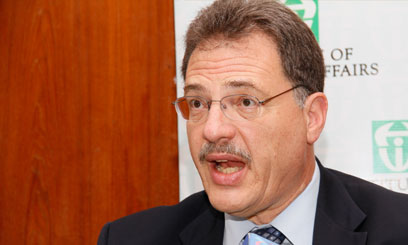Stanford University Center on Democracy, Development and the Rule of Law Director Larry Diamond says the government could, for example, distribute part of the oil earnings as cash to every citizen.
“If everyone has a mobile phone, you could in theory make a payment from the central government every month to every Kenyan – a share of the national oil wealth,” he said.
“Let them decide how the money is going to be invested to develop the country.”
Diamond argues that Kenya has an opportunity to be innovative in order to pre-empt what he calls the ‘disease of oil wealth’, which corrupts economic and political productivity along with the social morals of a country.
He stressed the importance of the government’s role in regulating the revenue streams from oil to ensure that the country doesn’t face the same tragic results as Nigeria, Angola, Gabon and Equatorial Guinea, where oil money has been stolen by the ruling elite, distorting production, destroying agriculture and corrupting the moral structure of government.
“My advice to Kenyan civil societies and government is to think about how the oil revenue and the functioning of the oil sector can be monitored more transparently,” he stated.
“This would make it very clear from the beginning what payments are being made by oil companies to the government and what arrangements and productions levels are agreed upon,” he explained.
He noted that Kenya has taken positive steps by being a member of the Open Government Partnership, a voluntary partnership of countries around the world that promotes transparency, empowers citizens, fights corruption, and harnesses new technologies to strengthen governance.
“Kenya is a founding member but its actual implementation so far is more inspirational than real so there is a lot of work still to be done,” he acknowledged.
“A vital tool in controlling corruption is to require the public declaration of assets by elected and high level appointed officials, in order to hold them accountable and to allow for scrutiny by citizens, civil societies and the mass media,” he added.
Diamond recommended that Kenya develop a broad reform agenda to improve the quality of governance and the neutrality, capacity and transparency of the state.
“There must be pressure from below, from within and from outside government, which can be accomplished by assembling multi-level coalitions for reform,” he emphasised.
“Kenya needs to implement gradual reforms to strengthen vertical and horizontal accountability by forming independent counter-corruption, audit, electoral and human rights commissions as well as right to information laws,” he asserted.
Speaking on Kenya’s plan to devolve the government in the next elections, Diamond supported the initiative as a political mechanism to manage ethnic division.
“If people know they’re going to have some control in their local affairs and they can determine how some of their resources are spent in their counties, it somewhat lowers the stakes in controlling the central government,” he explained.
“Devolution will be good for political stability, economic and social equity in terms of insuring that there’s breadth in the distribution of development resources and I think it has the potential to be great for accountability and transparency of government functioning,” he said.
He advocated for better pay, training and equipment for police officers, arguing that such reforms would boost their professional moral discouraging them from demanding bribes from the public.
“Better pay and training will ensure that they start taking pride in their work, leading to them being devoted to national development,” he said.
“There needs to be an independent civil service commission that promotes on merit,” he added.
He admitted that there will be challenges implementing these reforms in Kenya because those in power will oppose changes that could diminish their control.
“There are very powerful vested interests that are going to resist these reforms because any reforms that seek to make government more transparent and more accountable are going to limit the ability of government and politically connected business people to corruptly accumulate wealth,” he said.





No comments:
Post a Comment